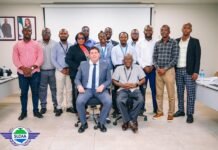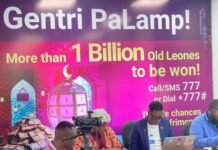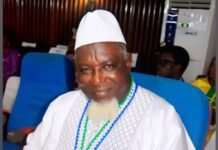Spectacular coastline, buzzing nightlife and charming people, Radhika Aligh explores the next must-visit city in West Africa
Twenty years after the end of the Civil War, Sierra Leone is exploring its tourism potential – and for good reason. Golden sand beaches, cultural and historic landmarks and eco-tourism initiatives are transforming the country into an exciting destination full of off-the-beaten-path experiences.
Freetown, the vibey capital, is an ideal starting point with well established hotels and boutique accommodations, a vibrant food scene, bustling markets and soft sand beaches where sunsets are picture-perfect. Located on the Atlantic coast of West Africa, the city was founded in 1792 by British abolitionists as a settlement for freed slaves. It has since grown into a buzzing urban centre with a diverse population of over one million.
Historic centre
The most famous landmark in Freetown is easy to miss, especially from inside a keke (tuk-tuk), navigating through the narrow, crowded streets in the shadow of colonial buildings. Cotton Tree, a giant kapok tree, which symbolises resilience and new beginnings, stands in the middle of a busy junction — all-consuming in its expanse. Former slaves arriving in Freetown would walk up from the shoreline to touch the tree and give thanks for their freedom.
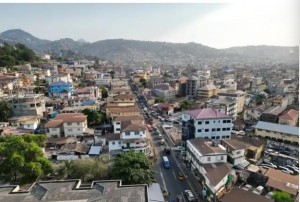
Under the branches of the Cotton Tree is the National Museum of Sierra Leone. It was founded in 1957 to preserve and promote cultural heritage. The museum houses artefacts, including traditional masks, musical instruments, textiles, and archaeological finds from various parts of the country. Some of the most notable exhibits include displays of history, Atlantic slave trade and the colonial period. The museum also has a significant collection of ethnographic materials like clothing, jewellery, and pottery from several ethnic groups.
A much newer museum — and home to significantly larger artefacts — is the National Railway Museum. Sierra Leone started its first passenger train service to the provinces in 1898 and made its last journey in 1975. The disused locomotives and carriages languished in workshops for thirty years until they made their way to the museum in 2005. Dotted around the warehouse-like space is a fine collection of historical 2’6″ gauge railway locomotives, coaches and wagons engineered and built in the United Kingdom. Among the large carriages is also a functioning pump trolley (handcar), used back in the day to transport maintenance workers.
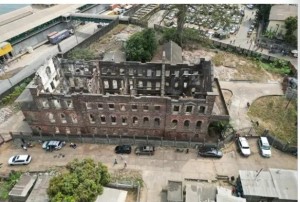
Two streets away from the museum is one of the most striking architectural structures: Old Fourah Bay College. It was established in 1827 as the first Western-style university in West Africa and is considered one of the oldest institutions of higher learning. The college was initially a Christian missionary school before developing into a full-fledged university. The derelict old campus, which still looks opulent, is set to go through a reconstruction facilitated by the World Monuments Fund.
Spectacular beaches
When Sierra Leoneans want to relax, they head to the beach. And with a whole coastline full of spectacular golden sand hideaways, there is plenty to choose from. The most popular is River No 2 which is particularly lively on a Sunday when hundreds of locals come down stocked with food and alcohol to last until the early hours of the morning. The free-for-all beach party concludes with singing and dancing around a huge bonfire set alight at midnight. River No 2 and neighbouring Tokeh Beach are also ideal for surfers looking to ride the Atlantic waves. Look back from the water to find forested rolling hills, the most idyllic backdrop to the sandy belt.
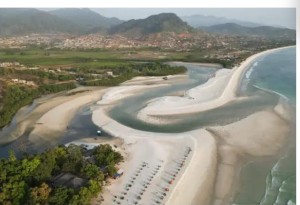
The coastline stretches for about 360 miles and is home to numerous fishing communities that use traditional fishing methods such as canoes, fishing nets, and lines to catch fish. Fishing is a primary economic activity for the local community in Kent, an hour away from Freetown, who typically catch tuna, mackerel, and barracuda to sell in local markets or export.
Most people pass through Kent to head to Banana Island a popular getaway for tired city dwellers ready to escape the hustle of modern life. The archipelago includes three islands: Dublin, Ricketts and MesMeheux, where visitors can indulge in snorkelling, scuba diving and kayaking. With no more than 600 inhabitants on the largest island, it is an intimate experience that allows travellers to slow down and explore the culture and traditions of this small community. Eco-tourism options are aplenty, with guesthouses and locally-led initiatives.
Wildlife and conservation
Thirty minutes from the old town, Tacugama Chimpanzee Sanctuary_is a rescue centre and conservation programme looking to protect wild chimpanzees and their habitat. The centre was born in 1995 when accountant-turned-conservationist BalaAmarasekaran and his wife Sharmila witnessed a weak and sick baby for sale on the outskirts of Freetown Thirtyyears on, the couple and their team ofveterinary doctors and rangers have created a safe space for hundreds of chimps by rehabilitating them in enclosures in semi-wild forested land.
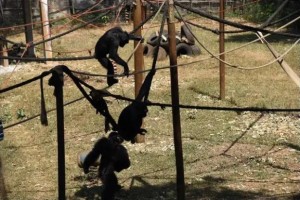
“We do a lot of research in terms of where the distribution is, where the chimps are, what are the threats in those areas,” Bala tells me. The nationwide survey and census found between 5500 and 6000 chimpanzees, the second or third largest population of western chimpanzees worldwide. In 2019, after relentless campaign work, the government of Sierra Leone announced chimpanzees as the national animal – to shift focus from an image associated with the civil war and blood diamonds.
For Bala, the title comes with higher responsibility to educate people, build a harmonious relationship between apes and humans and preserve their habitat. “At the moment, we work with 93 communities to try and protect the community forest and with the National Protected Area Authority to turn around two of the national parks that have been in a bad state. We raise awareness in many schools through an environmental education curriculum, so even a primary school kid will learn about chimpanzees and the need to protect the environment.”
Buzzing nightlife
Lumley Beach is where the party never stops. Lining both sides of the coastal road are bars, restaurants and clubs entertaining visitors and locals into the early hours. It is also the best place to catch the most beautiful sunsets with your favourite tipple. Bag yourself a top deck seat and soak in the golden hour whilst watching a beach football game, a sport taken very seriously in Salone.

Snack on some Italian gelato at Gjgibontä Ice Cream and Pizzeria, or head two doors down to China Town restaurant – Lumley Beach is where the diversity is most on show. A huge number of Indian and Lebanese immigrants brought with them cuisines and flavours from thousands of miles away. You can savour some of it in dozens of restaurants across Freetown. Just off Lumley Beach, Bliss serves a range of curries alongside a tempting European and fusion menu in a tranquil garden setting.
Traditional dishes like okra, spicy krain-krain, plasas (green leafy stews), binch (black-eyed bean) and locally caught fish are a must-try in Sierra Leone. They grace the menu of most hotels, but the best places to dig into them are local eateries or street vendors. At busy junctions and crossroads like Waterloo, you will find women approaching cars trying to flog fried cassava bread with fish gravy the flavours are unique to this part of Africa. Other street food dishes include sweet cakes and foofoo (or fufu) made with fermented cassava.
Cole Street Guesthouse opened its doors to the public in 2021 with the first gourmet restaurant entirely dedicated to traditional cuisine. Its chef and co-owner MiattaMarke left her legal job in London to return home to honour her roots and her grandmother Lati Hyde-Forster MBE, the first woman in Sierra Leone to graduate from university.
Through her homely dishes like Fourah (sweet rice flour dumplings) and Huntu (steamed cornmeal, spring onion and prawn dumplings), she pays homage to the flavours of her motherland.
Where to stay
A short walk from buzzing Lumley Beach, Radisson Blu Mammy Yoko Hotel is a secure and comfortable boarding option for those wanting to be in the thick of it. Take a dip in the ocean or chill by the outdoor pool. An indoor gym and two tennis courts have your workout regime covered while your nutrition is looked after by The Deck, their in-house restaurant serving breakfast, lunch and dinner.
All 171 rooms, from Standard to Business and Diplomatic to Presidential Suite, come with a balcony overlooking either the sea or the gardens and are decorated in modern neutral tones. The hotel is also home to a coffee shop and Baw Baw Bar, where cold beers and cocktails offer respite from the scorching heat.
Getting there
Air France operate flights from London Heathrow to Lungi International Airport via Paris. The city of Freet


